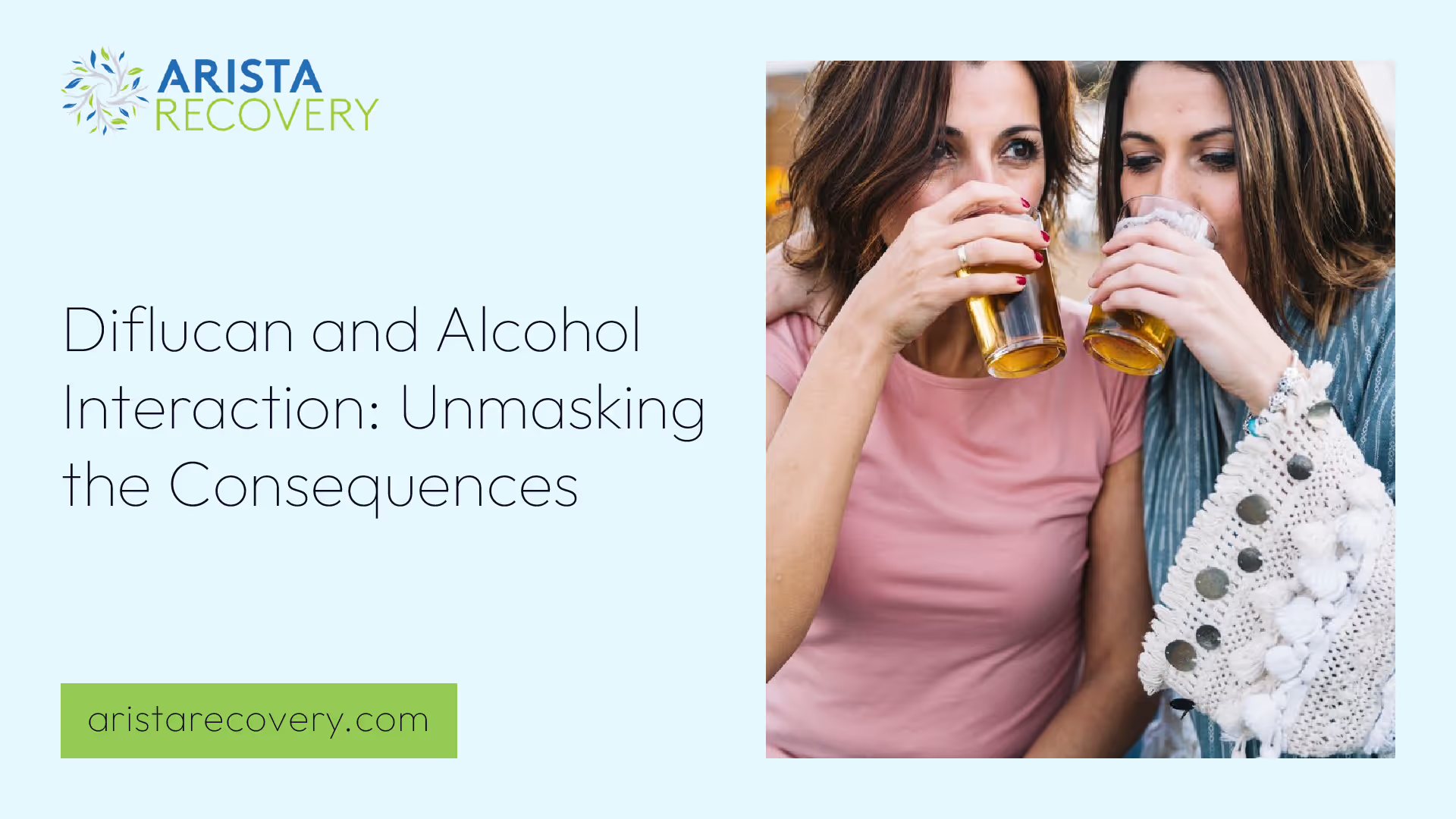Diflucan and Alcohol Interaction: Unmasking the Consequences

Understanding Diflucan
To understand the risks and consequences of the interaction between Diflucan and alcohol, it's crucial to first understand what Diflucan is and how it works.

What is Diflucan?
Diflucan, also known as fluconazole, is an antifungal medication commonly prescribed to treat various types of fungal infections. It is a powerful agent in the battle against fungal infections, often used when other methods of treatment have failed or are not suitable. Diflucan can also be employed preventively to ward off fungal infections in individuals undergoing chemotherapy or radiation therapy prior to bone marrow transplants.
The versatility and efficacy of Diflucan make it a staple in many healthcare providers' arsenals. However, like all medications, it is not without potential risks and side effects, especially when combined with substances like alcohol.
How Diflucan Works
Diflucan operates by inhibiting the growth and spread of fungi, thereby alleviating symptoms and promoting healing. More specifically, it disrupts the development of the fungal cell membrane, a critical component for the survival and propagation of the fungi.
By compromising the integrity of the fungal cell membrane, Diflucan effectively controls the infection and aids the body's immune system in eliminating it. The medication can be taken orally or administered intravenously, depending on the severity of the infection and the patient's overall health condition.
However, the effectiveness of Diflucan can be compromised by various factors, including the consumption of alcohol. Alcohol has the potential to interfere with the absorption, distribution, and metabolism of certain medications, including Diflucan. This interference can alter the effects of the medication and potentially reduce its effectiveness.
Therefore, understanding the interaction between Diflucan and alcohol is vital for those who are prescribed this medication. This knowledge can help prevent potential adverse effects and ensure the most effective treatment possible.
Risks of Combining Diflucan and Alcohol
The interaction between Diflucan and alcohol is a significant concern for those undergoing treatment with this medication. The combination can potentially affect the efficacy of the medication and also lead to adverse side effects.
Effect on Medication Efficacy
One of the primary concerns with the diflucan and alcohol interaction is the potential reduction in the effectiveness of the medication. Diflucan, a commonly prescribed antifungal medication, can have its efficacy compromised when combined with alcohol. Drinking alcohol while taking Diflucan can potentially interfere with the effectiveness of the medication in treating fungal infections, which can prolong the recovery process or even worsen the infection.
Furthermore, alcohol can influence the environment in the gut and change levels of organisms, potentially worsening infections like Candida. Therefore, to ensure the full effectiveness of Diflucan in treating fungal infections, it is generally recommended to avoid consuming alcohol during the treatment period.
Potential Side Effects
Apart from affecting the efficacy of Diflucan, the combination of alcohol and this medication can also exacerbate potential side effects. Notably, Diflucan can cause liver problems, and when taken with alcohol, this risk significantly increases.
Moreover, mixing alcohol with Diflucan can lead to several other health risks, including nausea, headaches, skin rash, and stomach upset. Severe side effects can also occur, such as severe dizziness, fainting, fast or irregular heartbeat.
In light of these potential risks and side effects, it is strongly advised to avoid alcohol consumption while undergoing treatment with Diflucan. Always consult with your healthcare provider for personalized advice regarding medication use and potential interactions.
Impact on Liver Health
The interaction between Diflucan and alcohol can have serious implications on liver health. It is crucial to understand the potential risks and take necessary precautions to prevent liver damage.
Alcohol, Diflucan, and Liver Damage
Drinking alcohol while taking Diflucan can increase the risk of liver damage and may diminish the effectiveness of the medication. The interaction between Diflucan and alcohol could lead to severe liver injuries due to increased liver enzyme levels and hepatotoxicity.
The combination of fluconazole (the active ingredient in Diflucan) and alcohol can increase the risk of liver damage, particularly in individuals with pre-existing liver conditions. Severe cases of liver damage due to simultaneous alcohol consumption and fluconazole use can result in liver failure, which can be life-threatening and necessitate emergency medical attention [6].
Preventing Liver Problems
Preventing liver damage is critical when taking Diflucan, especially because the liver is the organ that processes both alcohol and Diflucan. The simultaneous intake of these two substances can put undue stress on this vital organ and lead to serious health consequences.
Diflucan can cause liver problems when taken with alcohol. To prevent potential liver damage, it is recommended to avoid alcohol while taking this medication. It is always advisable to discuss with your healthcare provider about the safest way to use Diflucan, especially if you are prone to consuming alcohol regularly or have a history of liver disease.
In summary, in order to ensure the effectiveness of Diflucan treatment and to maintain good liver health, alcohol consumption should be avoided during the course of treatment. Always remember that your health is your responsibility and making informed decisions can go a long way in maintaining your well-being.
Precautions for Diflucan Use
While Diflucan is a commonly prescribed antifungal medication, there are important precautions to consider to ensure its safe and effective use. Two of these precautions include the potential for allergic reactions and interactions with other medications.
Diflucan and Allergic Reactions
Diflucan can cause allergic reactions in some people, with symptoms that may include hives, difficulty breathing, and swelling of the face, lips, tongue, or throat. Immediate medical attention is required if any of these symptoms are experienced while taking Diflucan.
Furthermore, Diflucan should not be used if the individual is allergic to fluconazole, the active ingredient in the medication. Before starting a course of Diflucan, individuals should inform their healthcare provider of any known allergies to avoid potential allergic reactions.
Diflucan and Other Medications
Interactions between Diflucan and other drugs can cause unwanted or dangerous effects. Certain medications, such as cisapride, erythromycin, pimozide, quinidine, astemizole, and higher doses of terfenadine, among others, are known to interact with Diflucan. Therefore, it's crucial to inform healthcare providers about all medications currently being used.
Moreover, individuals should inform their doctors of any history of liver disease, kidney disease, heart rhythm disorder, or a history of Long QT syndrome before taking Diflucan. Fluconazole, the active ingredient in Diflucan, may harm an unborn baby, so effective birth control should be used to prevent pregnancy while taking the medicine and for at least 1 week after the last dose.
A variety of other medications, including antibiotics, antifungals, heart or blood pressure medication, seizure medicine, and others, can interact with Diflucan. These interactions can cause a serious heart problem, especially when combined with certain other medicines for infections, asthma, heart problems, among others. This underscores the importance of discussing all current medications with the doctor.
Given the potential for diflucan and alcohol interaction, as well as interactions with other drugs, it's recommended to consult a healthcare professional before using Diflucan with alcohol or any other medications. In conjunction with professional healthcare guidance, these precautions can help ensure that Diflucan is used safely and effectively.
Managing Diflucan Treatment
Managing diflucan treatment effectively requires understanding the duration of therapy and the importance of medical consultation. These are key factors in ensuring the treatment's efficacy and minimizing any potential risks associated with diflucan and alcohol interaction.
Duration of Diflucan Therapy
The time it takes for Diflucan to start working can vary depending on the type and severity of the fungal infection being treated. In general, most people will start to see an improvement in their symptoms within 24 to 48 hours after taking Diflucan.
However, it's important to note that the entire course of treatment should be completed as prescribed by the healthcare provider, even if symptoms improve before the treatment duration is complete. Deviating from the recommended guidelines may undermine the effectiveness of the medication and may lead to the persistence or recurrence of the fungal infection.
Importance of Medical Consultation
Medical consultation plays a crucial role in managing Diflucan treatment. Before starting the treatment, it's important to discuss the use of alcohol with your doctor to ensure the safe and effective use of the medication.
In addition, patients should inform their doctors of any history of liver disease, kidney disease, heart rhythm disorder, or a history of Long QT syndrome. Fluconazole, the active ingredient in Diflucan, may harm an unborn baby, so effective birth control should be used to prevent pregnancy while taking the medicine and for at least 1 week after the last dose [7].
It's also crucial to inform healthcare providers about all medications being used as interactions with other drugs can cause unwanted or dangerous effects. This includes not only prescription and over-the-counter medicines, but also vitamins, herbal products, and recreational drugs.
In conclusion, managing Diflucan treatment requires careful consideration of the duration of therapy and the importance of medical consultation. By adhering to the prescribed treatment plan and maintaining open communication with healthcare providers, patients can ensure the safe and effective use of Diflucan while minimizing the potential risks associated with diflucan and alcohol interaction.
Alternatives to Alcohol During Treatment
While undergoing Diflucan treatment, it is crucial to be mindful of the potential risks and complications that can arise from consuming alcohol. Given the serious health implications, it is highly recommended to explore alternatives to alcohol.
Non-Alcoholic Options
The diflucan and alcohol interaction can lead to various health issues including stomach pain, nausea, vomiting, headache, flushing, and potential worsening of infections such as Candida. In light of these risks, opting for non-alcoholic beverages during treatment is a wise choice.
There are numerous enjoyable and refreshing non-alcoholic options available such as:
- Herbal teas: These can be a soothing alternative and also offer various health benefits.
- Fruit juices: Fresh fruit juices can provide the body with essential vitamins and antioxidants.
- Infused water: Adding slices of fruits or herbs can enhance the taste of water.
- Non-alcoholic beers or wines: These provide similar taste experiences to their alcoholic counterparts without the alcohol content.
It's also important to stay hydrated during treatment, as this can help the body to process the medication effectively.
Safe Alcohol Consumption Guidelines
Although it is strongly advised to avoid alcohol entirely during Diflucan treatment, if one chooses to consume alcohol, it is essential to do so responsibly and in moderation.
Alcohol interferes with the metabolism of Diflucan, potentially prolonging the recovery process and reducing the overall effectiveness of the medication. Moreover, combining alcohol with Diflucan puts excessive strain on the liver, increasing the risk of liver damage and toxicity [4].
If you decide to drink alcohol, be sure to do so responsibly:
- Limit your alcohol intake: The less alcohol you consume, the less impact it will have on your medication and health.
- Space out your drinks: Try to have a non-alcoholic drink, like water, in between alcoholic ones.
- Eat before you drink: This can help to slow the absorption of alcohol.
However, the safest option is to avoid alcohol consumption entirely while undergoing Diflucan treatment to ensure optimal efficacy of the medication and to prioritize liver health. Always consult your healthcare provider for personalized advice regarding alcohol consumption during treatment.
References
[1]: https://transcendrecoverycommunity.com/blog/fluconazole-diflucan-alcohol-is-it-safe
[2]: https://www.urbanrecovery.com/blog/diflucan-and-alcohol
[3]: https://www.urbanrecovery.com/blog/diflucan-and-alcohol?e7fa5e2b_page=14
[4]: https://www.northstarbehavioralhealthmn.com/resources/diflucan-and-alcohol
[5]: https://www.webmd.com/drugs/2/drug-3774-5052/diflucan-oral/fluconazole-oral/details
[6]: https://www.guardianrecovery.com/addiction-treatment/alcohol-abuse-addiction/mixing-alcohol-fluconazole/
You’re not alone in this.
When mental health challenges and addiction intersect, it can feel isolating. At Arista, we offer compassionate, evidence-based, and trauma-informed care to help you heal, grow, and move forward.
You’re not alone in this.
When mental health challenges and addiction intersect, it can feel isolating. At Arista, we offer compassionate, evidence-based, and trauma-informed care to help you heal, grow, and move forward.
Support that moves with you.
You’ve taken a brave first step. At Arista Recovery, we’re here to help you continue with best-in-class care designed for long-term healing and support.
.webp)






